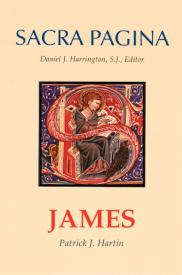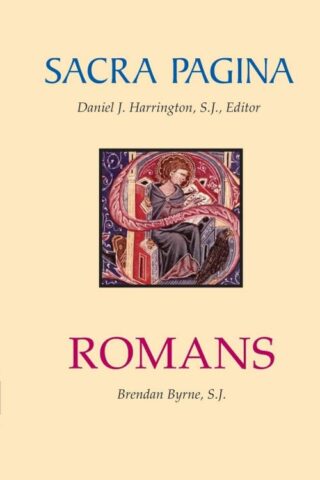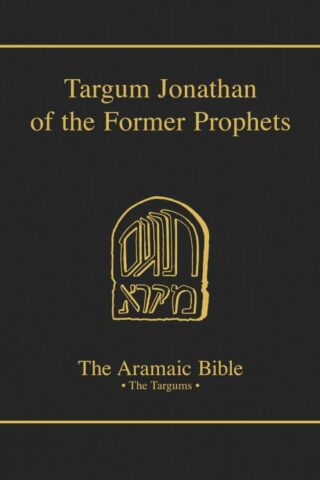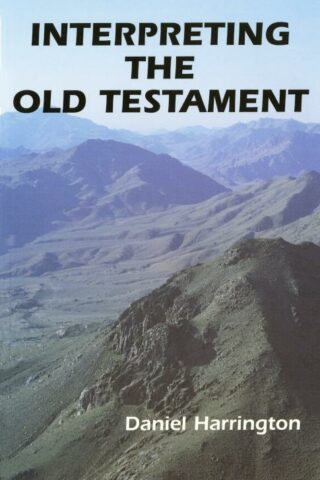Daniel Harrington
Showing all 12 results
-
Hebrews
$44.95Add to cartScarcely any book of the New Testament (with the possible exception of Revelation) is so perplexing as the “Letter to the Hebrews.” Not really a letter, but a sermon with some features of a letter added to it, not really by its putative author, Paul, but by an anonymous Christian who wrote some of the most elegant Greek in the Bible, not really addressed to the “Hebrews,” but to Christians, probably in Rome-this is the work that Alan Mitchell explains in this commentary.
Many scholars have written fine commentaries on Hebrews, and Mitchell stands on their shoulders, noting where he proposes alternate interpretations. Mitchell pays particular attention to the reliance of the author of Hebrews on the Greek Old Testament (the Septuagint). He also compares the language of Hebrews with similar usage and ideas of first-century Hellenistic Jewish authors, notably Flavius Josephus and Philo of Alexandria. Furthermore, he situates Hebrews against the background of the tradition of Hellenistic Moral Philosophy, where that is appropriate. Mitchell thus locates Hebrews in its proper thought-world, something that is essential for the modern reader in dealing with some of the thornier questions raised by this biblical book. Chief among these are the role of sacrificial atonement, the question of “second repentance,” and the spiritual and moral formation of the Roman Christians who were its recipients.
Like all the volumes in the Sacra Pagina series, this work examines the text in detail, with careful attention to the words and phrasing, and then brings those individual insights together into a coherent summary. The bibliography and special lists appended to each chapter cover the best of recent scholarship on the Letter to the Hebrews.
-
Pastorial Epistles : First Timothy Second Timothy And Titus
$29.95Add to cartFirst and Second Timothy and Titus have for many years borne the collective title “The Pastoral Epistles.” Both their style and their content make it difficult to locate them within the corpus of Pauline letters, and recent scholarship most often considers them pseudonymous, works that imitate Paul’s letters but apply the apostle’s teaching to the concerns of a later time, two or more decades after Paul’s death.
The Pastorals differ from Paul’s own letters in being addressed to single individuals, coworkers of Paul who have been placed in charge of particular churches-Timothy apparently in Ephesus, Titus in Crete. They provide instruction for community leaders, both the individual addressees and other leaders whom they will appoint. The specification of certain offices within the local churches is one of the features that appear to locate these works in a later phase of church development.
In this commentary Benjamin Fiore, SJ, places the Pastorals in their historical and literary context. The reader will find here a solid introduction to parallel literary forms in Latin and Greek literature and particular descriptions of the way in which these documents use ancient rhetorical forms to achieve their paraenetic and hortatory purpose. Drawing on his parish experience as well as his academic training, Fiore also provides reflections on the contemporary pastoral application of these books, giving readers a renewed appreciation for the “pastoral” label these epistles bear.
-
Why Do We Hope
$19.95Add to cartIn this follow up to his popular book, What Are We Hoping For? New Testament Images, Daniel Harrington extends his reflections on hope in the Scriptures. He draws us into the striking images of the psalms – the mountain, the sun, refuge, the kingdom, sheltering wings, the olive tree, and the shepherd – to lead us to the discovery that hope is the predominant image of the book of Psalms.
Even in their darkest laments, the psalmists remind us that God hears us and will never abandon us. In these brief essays, Harrington opens up the language of forty psalms, explores their literary ahd historical context, and then ties the psalm to our reading as Christians whose ultimate hope is in Jesus Christ.
-
Jesus Ben Sira Of Jerusalem
$21.95Add to cartQuestions of vocation and character formation become important to students as they continue to receive higher education. Jesus Ben Sira combines secular wisdom from Near Eastern wisdom sources and divine revelations from the Hebrew Bible to create the Book of Sirach. By applying form criticism to Ben Sira’s book, Daniel J. Harrington provides students with historical information of the psychological and sociological context underlying Ben Sira’s teachings, as well as an understanding of how Ben Sira’s ancient wisdom can contribute to personal and social formation in the 21st century.
-
Gospel Of Mark
$29.95Add to cartIn The Gospel of Mark Fathers Donahue and Harrington use an approach that can be expressed by two terms currently used in literary criticism: intratextuality and intertextuality. This intratextual and intertextual reading of Mark’s Gospel helps us to appreciate the literary character, its setting in life, and its distinctive approaches to the Old Testament, Jesus, and early Christian theology.
“Intratextuality” means we read Mark as Mark and by Mark. Such a reading expresses interest in the final form of the Gospel (not its source or literary history) and in its words and images, literary devices, literary forms, structures, characterization, and plot. Reading Mark by Mark gives particular attention to the distinctive vocabulary and themes that run throughout the Gospel and serve to hold it together as a unified literary production.“Intertextuality” comprises the relation between texts and a textual tradition, and also referring to contextual materials not usually classified as texts (e.g., archaeological data). “Intertextuality” is used to note the links of the text of Mark’s Gospel to other texts (especially the Old Testament) and to the life of the Markan community and of the Christian community today.
-
Jesus And Virtue Ethics
$42.00Add to cartThe Histories Of Moral Theology And New Testament Ethics
Methods: The New Testament And Moral Theology
The Kingdom Of God As Horizon And Goal: Who Ought We To Become?
Discipleship As Context: Who Are We?
The Sermon On The Mount And Christian Virtue Ethics: How Do We Get There?
Love As The Primary Value
Sin As Failure To Love
Politics From A Marginal Perspective
Justice And Social Justice
Embodiment And Community As The Context For Sexual Ethics
Marriage And Divorce
Celibacy, Homosexuality, And Abortion
The Bible And Nature: Friends Or Foes?
Additional Info
Jesuits Daniel Harrington and James Keenan have successfully team-taught the content of this landmark study to the delight of students for years. In this book they take the fruits of their own experiences as theologians, writers, teachers, mentors, and friends to propose virtue ethics as a bridge between the fields of New Testament Studies and Moral Theology.Answering the call of the Second Vatican Council for moral theology to “draw more fully on the teaching of Holy Scripture,” the authors examine the virtues that both flow from Scripture and provide a lens by which to interpret Scripture. By remaining true to both the New Testament’s emphasis on the human response to God’s gracious activity in Jesus Christ and to the ethical needs and desires of Christians in the twenty-first century, the authors address key topics such as discipleship, the Sermon on the Mount, love, sin, politics, justice, sexuality, marriage, divorce, bioethics, and ecology.
Covering the entire sweep of ethical teaching from its foundations in Scripture and especially in Jesus’ life, death, and resurrection to its goal or “end” with the full coming of God’s kingdom, the authors invite readers more deeply into an appreciation of the central biblical themes and how, based on the themes, Catholic Christian moral theology bears on general ethical issues in culture. Complete with reflection questions and suggestions for further reading, this book is essential reading for professors, students, pastors, preachers, and interested Catholics.
-
James
$64.95Add to cartIn his commentary on the letter of James, Hartin offers a unique approach toward understanding a much-neglected writing. Refusing to read the letter of James through the lens of Paul, Hartin approaches the letter in its own right. He takes seriously the address to “the twelve tribes in the Dispersion” (1:1) as directed to Jews who had embraced the message of Jesus and were living outside their homeland, Israel. At the same time, Hartin shows how this letter remains true to Jesus’ heritage. Using recent studies on rhetorical culture, Hartin illustrates how James takes Jesus’ sayings and performs them again in his own way to speak to the hearers/readers of his own world.
Hartin examines the text, passage by passage, while providing essential notes and an extensive explanation of the theological meaning of each passage. The value of this commentary lies in its breadth of scholarship and its empathic approach to this writing. The reader will discover new and refreshing insights into the world of early Christianity as well as a teaching that is of perennial significance.
-
Why Do We Suffer
$19.95Add to cartAddressing difficult questions in a readable, pastoral style, Father Harrington helps you draw meaningful and personal connections between Scripture and your own experience. Why Do We Suffer? helps you understand the concepts and context of suffering in the Bible.
-
Invitation To The Apocrypha A Print On Demand Title
$25.99Add to cartIn this volume a leading biblical scholar helps readers rediscover the ancient books of the Old Testament Apocrypha. INVITATION TO THE APOCRYPHA provides a clear, basic introduction to these important–but often neglected–ancient books that is ideal for personal study, churches, and classroom settings. Using the latest and best scholarship yet writing for those new to the Apocrypha, Daniel Harrington guides readers through the background, content, and message of each book. A distinctive feature of this primer is that it focuses throughout on the problem of suffering, highlighting what each book of the Apocrypha says about this universal human experience.
-
Romans
$69.95Add to cartWhile widely acknowledged as the single most influential document in Christian history, Paul’s Letter to the Romans has also attracted the most comment. Standing at the head of Paul’s writings in the New Testament and so eloquently delivering his Gospel, Romans has presented Paul to generations of readers: from Augustine in the fifth century, through the Reformation era, down to the present day.
This commentary adopts a literary-rhetorical approach, viewing the letter as an instrument of persuasion designed to transform readers through a celebratory presentation of the Gospel. Reflecting upon the fate of Jews and Gentiles, Paul wins his audience to a vision of a God who always acts inclusively. The God who, in the person of Israel’s Messiah (Jesus), has acted faithfully to include the Gentile peoples within the community of salvation, will not fail to see to the eventual inclusion of Israel as well. In the victory of grace displayed already in the risen humanity of Jesus, the original design of the Creator for human communities and for the world begins to come true.
The interpretation of Paul’s letter to Rome has accompanied and stimulated the path of Christian theology down to today. Romans touches upon virtually all main issues of Christian theology as well as presenting a rewarding introduction to Paul. Byrne facilitates full access to Paul and his Gospel through the letter, allowing Christians today to hear Paul’s voice as intelligibly and powerfully as it has spoken to past generations. Includes an updated bibliography and appendix.
-
Targum Jonathan Of The Former Prophets
$99.95Add to cartThe attribution, by the Babylonian Talmud, of this Targum to Jonathan ben Uzziel is suspect on several counts: among others, the silence concerning Jonathan in the parallel passage in the Palestinian Talmud, and the fanciful suggestion that Onkelos=Aquila and Jonathan=Theodotion. The attribution, therefore, is not to be taken as historical fact. The Talmud may have been attempting to enhance the authority of the Targum by claiming authorship by a disciple of Hillel, which Jonathan was.
It is generally agreed that the author of the Targum Jonathan is unknown; in fact, it is preferable to consider multiple authorship. For while language and translation techniques are uniform, there is variety from book to book.
-
Interpreting The Old Testament
$24.95Add to cartThis introduction to Old Testament exegesis responds to the directives of the Second Vatican Council that instructs biblical interpreters to investigate the meaning the sacred writers intended to express. Thus it acquaints readers with an introduction to the methods commonly used in biblical scholarship today.













